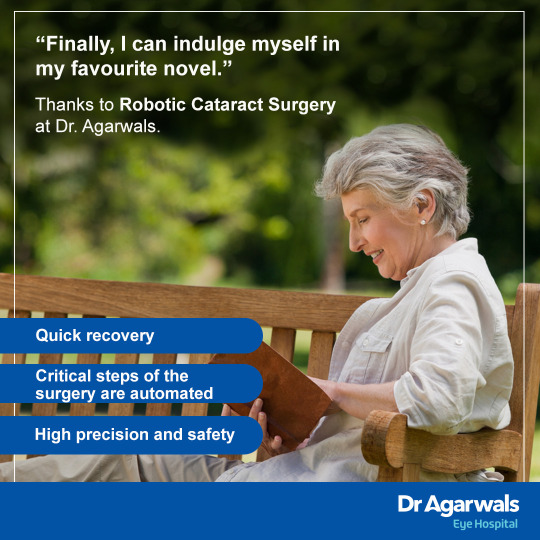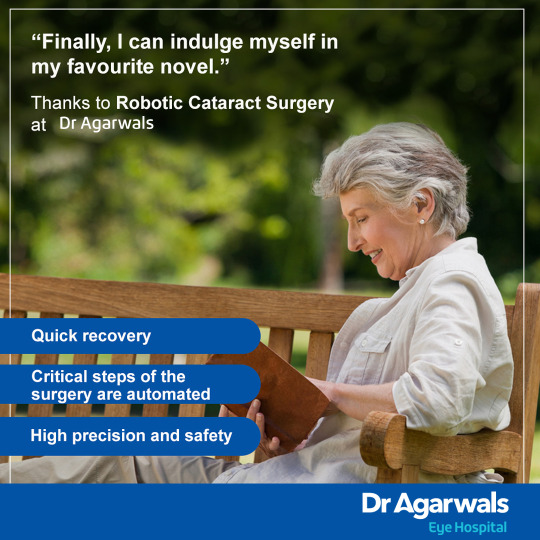Don't wanna be here? Send us removal request.
Text
Navigating Your LASIK Surgery Recovery: A Comprehensive Guide
So, you've taken the leap and undergone LASIK eye surgery to bid farewell to glasses and contacts – congratulations! Now, as you embark on your journey towards clearer vision, it's essential to understand what to expect during the LASIK surgery recovery process. In this guide, we'll walk you through the ins and outs of LASIK recovery, offering valuable insights and practical tips to ensure a smooth and successful healing journey.
Understanding LASIK Surgery Recovery
LASIK, short for Laser-Assisted In Situ Keratomileusis, is a minimally invasive procedure designed to reshape the cornea and correct refractive errors such as nearsightedness, farsightedness, and astigmatism. While LASIK boasts a high success rate and rapid visual improvement, it's normal to experience some degree of discomfort and adjustment during the initial recovery period.
Immediate Post-Operative Care
Following your LASIK surgery, your eye care provider will provide detailed post-operative instructions to promote optimal healing and minimise the risk of complications. These instructions may include:
Rest and Relaxation
Take it easy during the first 24 to 48 hours following LASIK surgery. Avoid strenuous activities, heavy lifting, and rubbing your eyes to prevent irritation and potential injury to the cornea.
Use of Medications
Your doctor may prescribe eye drops or medications to prevent infection, reduce inflammation, and promote healing. Follow your medication schedule diligently and avoid skipping doses to ensure effective treatment.

Protective Eyewear
Wear protective eyewear, such as sunglasses, to shield your eyes from bright lights, dust, and debris during the initial recovery period. Avoid exposure to smoke, pollutants, and swimming pools to minimise the risk of irritation and infection.
Avoiding Eye Makeup and Cosmetics
Refrain from using eye makeup, creams, and cosmetics around the eyes for at least one week following LASIK surgery. These products can introduce bacteria and irritants that may compromise the healing process.
Attend Follow-Up Appointments
Attend all scheduled follow-up appointments with your eye care provider to monitor your progress, assess your visual acuity, and address any concerns or complications promptly.
Managing Common Symptoms
During the LASIK surgery recovery process, it's common to experience temporary side effects and symptoms as your eyes adjust to their new shape. These may include:
Dry Eyes: Many patients experience temporary dryness, itching, or burning sensations in the eyes following LASIK surgery. Use lubricating eye drops as recommended by your doctor to alleviate discomfort and maintain moisture balance.
Blurry Vision: It's normal for your vision to fluctuate or appear blurry in the days and weeks following LASIK surgery as your eyes heal and stabilise. Avoid driving or engaging in activities that require sharp vision until your vision clears and stabilises.
Light Sensitivity: Increased sensitivity to light, glare, and halos around bright lights is common during the LASIK recovery period. Wear sunglasses outdoors and minimise exposure to bright lights and screens to reduce discomfort.
Halos and Glare: Some patients may experience halos, glare, or starbursts around lights, especially at night. These visual disturbances typically improve over time as your eyes adjust to the changes made during LASIK surgery.
Eye Discomfort: Mild discomfort, irritation, or foreign body sensation in the eyes is normal during the initial days following LASIK surgery. Avoid rubbing or touching your eyes and use prescribed eye drops to alleviate discomfort and promote healing.
Patience and Persistence
LASIK surgery is a life-changing procedure that requires patience, persistence, and a commitment to following post-operative instructions. While the recovery process may vary from person to person, most patients experience significant improvement in their vision within the first few days to weeks following surgery.
LASIK Eye Surgery Hospitals: Choosing the Right Provider
When considering LASIK eye surgery, it's crucial to choose a reputable eye care provider with a track record of excellence in refractive surgery. Look for LASIK eye surgery hospitals equipped with state-of-the-art technology, experienced surgeons, and a patient-centric approach to care.
Dr Agarwals Eye Hospital stand at the forefront of LASIK surgery, offering cutting-edge facilities and a team of skilled ophthalmologists dedicated to delivering superior outcomes. With a commitment to innovation, safety, and patient satisfaction, Dr Agarwals Eye Hospitals are your trusted partner in achieving clearer vision and a brighter future.
Hence, LASIK surgery offers a transformative solution for individuals seeking freedom from glasses and contacts. By understanding the LASIK surgery recovery process and partnering with a reputable eye care provider, you can embark on your journey towards clearer vision with confidence and peace of mind. Here's to a future filled with clarity, comfort, and the joy of seeing the world with newfound clarity!
0 notes
Text
What Is the Cost of Cataract Surgery?
Have you ever felt like your vision was clouded, as if you were looking through a foggy window pane? If so, you might be experiencing the onset of cataracts, a common eye condition that affects millions of people worldwide. Fortunately, cataract surgery offers a ray of hope, restoring clarity and sharpness to your vision. In India, where healthcare options abound, understanding the cost of cataract surgery and where to find the best care is essential. So, let's delve into this topic and shed light on what you need to know.
Understanding Cataracts
Before we dive into the cost of cataract surgery, let's understand what cataracts are. Cataracts occur when the lens of the eye becomes cloudy, leading to blurry vision and difficulty seeing clearly. They often develop slowly over time and are primarily associated with ageing, although other factors like diabetes, smoking, and prolonged exposure to sunlight can also contribute to their formation.
The Importance of Cataract Surgery
For those affected by cataracts, surgery is often the only effective treatment. During cataract surgery, the cloudy lens is removed and replaced with a clear artificial lens, restoring vision and improving quality of life significantly. The procedure is generally safe and highly successful, with millions of surgeries performed each year around the world.
Cost Considerations
Now, let's address the elephant in the room: the cost of cataract surgery in India. One of the most appealing aspects of seeking medical treatment in India is the affordability of healthcare services compared to many other countries. The cost of cataract surgery in India can vary depending on several factors, including the choice of hospital, the type of lens used, and any additional medical services required.
Finding Low-Cost Options
If you're searching for low-cost cataract surgery hospitals in India, you'll be pleased to know that there are numerous options available. Many hospitals and clinics across the country offer high-quality cataract surgery at a fraction of the cost compared to Western countries. These facilities are equipped with state-of-the-art technology and staffed by skilled ophthalmologists who specialise in performing cataract surgeries.
Exploring Price Ranges
The price of cataract surgery in India can vary widely depending on the location and reputation of the hospital, as well as the specific requirements of the patient. On average, the cost of cataract surgery in India ranges from INR 20,000 to INR 50,000 per eye (approximately USD 270 to USD 675). However, it's essential to remember that these figures are just estimates, and actual costs may vary.

Choosing the Best Hospitals
When it comes to something as precious as your vision, quality should never be compromised. While cost is undoubtedly a significant factor, it's equally important to prioritise the reputation and expertise of the hospital and medical professionals involved. Some of the best cataract surgery hospitals in India can be found in major cities like Mumbai, Delhi, Chennai, and Bangalore. These hospitals boast world-class facilities and a track record of excellence in eye care.
Factors to Consider
When evaluating cataract surgery hospitals, consider factors such as the qualifications and experience of the surgeons, the quality of pre-and post-operative care, the range of services offered, and patient reviews and testimonials. Additionally, don't hesitate to ask questions and discuss any concerns you may have with your healthcare provider.
Hence, cataract surgery offers a life-changing opportunity to regain clear vision and improve your overall quality of life. In India, where healthcare options are abundant and affordable, accessing high-quality cataract surgery has never been more accessible. By understanding the cost factors and exploring reputable hospitals, you can embark on your journey towards better vision with confidence and peace of mind.
Remember, your eyesight is precious—take the necessary steps to protect and preserve it for years to come. Whether you're seeking low-cost options or prioritising quality care, India offers a wealth of opportunities for cataract surgery that can help you see the world with newfound clarity. To know more about cataracts, you can reach out to our eye specialists at Dr Agarwals Eye Hospital for all kinds of eye issues. Call Us 9594924026 | 080-48193411 to book your appointment now.
#cataract eye surgery hospitals#best cataract eye surgery#cataract eye hospitals#best cataract eye hospitals#Dr Agarwals Eye Hospitals
0 notes
Text
What is the Ideal Gap Between Two Cataract Surgery?
Understanding Cataract Surgery
Before delving into the optimal interval between surgeries, it's crucial to understand the basics of cataract surgery. Cataracts occur when the natural lens of the eye becomes cloudy, leading to blurred vision and other visual disturbances. During cataract surgery, the cloudy lens is removed and replaced with an artificial intraocular lens (IOL), restoring clear vision.
Factors Influencing the Decision
Several factors influence the decision regarding the timing of cataract surgeries for both eyes
Visual Impairment
The primary reason for cataract surgery is visual impairment. The degree of impairment in each eye may vary, influencing the urgency of surgery.
Patient Preferences
Some patients may prefer to undergo both surgeries within a short time frame to expedite the overall recovery process.
Surgeon Recommendations
Ophthalmic surgeons play a pivotal role in guiding patients on the optimal timing between surgeries based on individual health considerations and surgical outcomes.
Medical Conditions
The presence of other medical conditions, such as diabetes or cardiovascular issues, may impact the decision-making process, as these conditions can affect the overall health and healing capacity of the patient.
Balancing Visual Rehabilitation and Safety
While some patients may express a desire to have both eyes corrected simultaneously, surgeons often recommend a more conservative approach. The general consensus among ophthalmic professionals is to allow a gap between cataract surgeries to ensure optimal visual rehabilitation and reduce potential complications.
Monovision Considerations
Monovision, a technique where one eye is optimised for distance vision and the other for near vision, may be an option for certain patients. However, adjusting to monovision can take time, and patients need to be comfortable with this approach.
Adaptation Period
Allowing a gap between surgeries gives patients the opportunity to adapt to the changes in vision in one eye before undergoing the second procedure. This can be particularly important for individuals with high visual demands, such as those who drive or work extensively on computers.
Reducing Infection Risk
Spacing out cataract surgeries helps minimise the risk of infection, a concern that becomes more significant when both eyes are operated on in close succession.
Why visit a Cataract specialist?
Visit a cataract specialist if you are experiencing-
Trouble with night vision
Increased sensitivity to light
Double vision in one eye
Hazy or foggy vision
Blurry vision
Advantages of Cataract Surgery
Clear vision
Brighter colours
More independence
Increased safety
One-time treatment
Quick Action is Crucial
Avoid postponing your visit because untreated conditions may result in:
Gradual deterioration of vision.
Potential for permanent blindness.
Elevated risks of falling and accidents.
Difficulty in performing routine daily tasks.
Hence, the optimal gap between two cataract surgeries is a nuanced decision that should be made collaboratively between the patient and their ophthalmic surgeon. While some may choose a shorter interval for personal or logistical reasons, the majority of surgeons recommend allowing a sufficient gap to ensure a smoother visual adaptation, reduce the risk of complications, and optimise overall patient safety.
Ultimately, the goal of cataract surgery is to enhance not only the clarity of vision but also the quality of life. By striking the right balance between visual rehabilitation and patient safety, individuals can embark on their post-surgery journey with confidence, enjoying the world through a clearer and brighter lens.
#cataract eye surgery#best cataract eye hospitals#eye hospitals#cataract eye surgery hospitals#cataract eye care treatment#cataract surgery
0 notes
Text
What Is Considered Strenuous Activity After Cataract Surgery?
What Is Considered Strenuous Activity After Cataract Surgery?
Cataract surgery has become a routine and highly effective procedure for restoring vision impaired by the clouding of the eye's natural lens. To ensure a safe and successful outcome, patients must follow post-operative guidelines diligently, especially when it comes to engaging in physical activities. In this blog, we will explore what constitutes strenuous activity after cataract surgery and how patients can navigate their recovery phase while considering factors such as safety, effectiveness, and the associated costs.
How to Get Safe and Effective Cataract Surgery?
The first step in ensuring a smooth recovery from cataract surgery is to choose a reputable eye surgery hospital and a skilled cataract surgery specialist. Whether you are in search of best eye surgery hospitals in major cities or specific cataract surgery specialists, thorough research is essential. Look for hospitals and specialists with a proven track record of successful surgeries, positive patient experiences, and a commitment to the highest standards of safety and care.
What is Strenuous Activity?
After cataract surgery, patients are advised to avoid strenuous activities during the initial stages of recovery. Strenuous activities involve any physical exertion that could increase intraocular pressure, potentially leading to complications such as increased inflammation, bleeding, or a dislocated intraocular lens.

Strenuous activities to avoid after cataract surgery include
Heavy Lifting: Activities that involve lifting heavy objects can strain the body and increase intraocular pressure. Patients should refrain from lifting objects exceeding the weight limit specified by their surgeon.
Intense Exercise: Vigorous exercises such as running, weightlifting, or high-impact aerobics can elevate heart rate and blood pressure, potentially affecting the eyes. Instead, patients are encouraged to engage in light, low-impact exercises like walking.
Bending Over: Activities that involve bending at the waist, like tying shoelaces or gardening, should be approached with caution. Sudden movements can strain the eyes and hinder the healing process.
Rubbing the Eyes: Touching or rubbing the eyes can introduce bacteria, increasing the risk of infection. Patients are advised to resist the urge to touch or rub their eyes, especially in the immediate postoperative period.
Recovery Protocols and Patience:
In addition to avoiding strenuous activities, patients must adhere to specific recovery protocols prescribed by their cataract surgery specialists. These protocols typically include
The use of prescribed eye drops,
Attending follow-up appointments, and
Practising good eye hygiene.
Patience is a virtue during the recovery period. While the majority of patients experience significant improvement in vision shortly after surgery, complete recovery may take some time. Understanding that the healing process is gradual can help manage expectations and reduce anxiety. Patience is particularly vital when it comes to engaging in regular activities, including work and social commitments.
What is the Importance of Follow-Up Appointments?
Regular follow-up appointments with the cataract surgery specialist are integral to monitoring progress and addressing any potential issues promptly. These appointments allow the surgeon to assess visual acuity, evaluate the health of the eye, and make any necessary adjustments to the treatment plan.

Patients should not overlook the significance of these follow-up appointments, as they provide an opportunity to discuss concerns, ask questions, and receive personalised guidance on when it is safe to resume specific activities. Clear communication with the surgeon fosters a collaborative approach to recovery, ensuring that any potential complications are identified and addressed early on.
Cost of Cataract Surgery Hospitals
While prioritising safety and effectiveness, it's also essential to consider the cost of cataract surgery, especially for those seeking treatment in specific cities. The cost of cataract surgery can vary based on factors such as the hospital's reputation, the surgeon's expertise, and the type of intraocular lens used.
Potential patients should research and compare the costs of cataract surgery hospitals in their city, keeping in mind that higher costs may reflect better facilities, experienced surgeons, and advanced technology. It's crucial to strike a balance between quality and affordability, ensuring that the chosen hospital provides optimal care without breaking the bank.
Choosing Dr Agarwals Eye Hospital for your cataract treatment is synonymous with choosing excellence, experience, and an unwavering dedication to your vision. Illuminate your path to vision restoration with the trusted experts at DR Agarwal's – where your eyes take precedence, and your vision is their mission. Seize the opportunity to schedule your consultation today and embark on the first steps towards a future filled with brighter, clearer vision. Dial [9594924026 | 080-48193411] to know more about eye care tips.
In the journey towards restored vision through cataract surgery, patients must prioritise safety, effectiveness, and cost. Choosing reputable eye surgery hospitals and specialists, understanding and avoiding strenuous activities during recovery, and considering the associated costs are crucial steps in achieving a successful outcome. By taking a proactive approach and following postoperative guidelines diligently, patients can navigate their post-cataract surgery journey with confidence and pave the way for a clearer and brighter future.
#best eye hospitals#eye care hospitals#eye surgery specialist#eye hospitals#cataract eye surgery#cataract surgery hospitals
1 note
·
View note